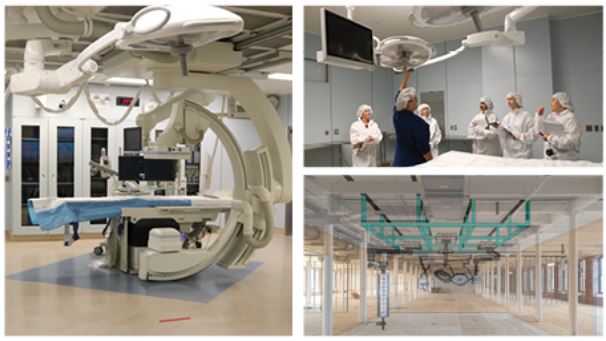
Clemson Project Recognized for Conceptual Design Excellence at Healthcare Design Expo
A Clemson University project integrating research and design to develop a safer, more ergonomic operating room received two awards for conceptual design excellence at the Healthcare Design Expo + Conference in Orlando.
The Healthcare Environment Awards, sponsored by Contract magazine and The Center for Health Design, selected the Realizing Improved Patient Care Through Human-Centered Design in the Operating Room prototype as the sole winner in the conceptual design category. These awards honor innovative architectural and interior design solutions that enhance the quality of health care delivery.
During the inaugural Evidence-Based Design Touchstone Awards, the prototype also received the Gold Level EBD Touchstone Award, which recognizes the use of an evidence-based design process in the pursuit of increasing value, improving outcomes and engaging stakeholders.
Anjali Joseph, Spartanburg Regional Health System Endowed Chair in Architecture + Health Design and director of the Center for Health Facilities Design and Testing at Clemson University, spearheaded RIPCHD.OR. She worked with a multidisciplinary team of researchers and clinical specialists from the Medical University of South Carolina and Heath Sciences South Carolina. She also worked with Clemson colleagues, including David Allison, professor and director of the university’s Architecture + Health graduate program. Allison led the design development of the prototype and incorporated it into a semester-long project for Architecture + Health students.
“These awards are an indication that our research-integrated design will play a pivotal role in creating safer healing environments for patients across the country,” said Joseph. “It is an honor to be recognized for the research our team has completed and the work being done by Clemson’s Architecture + Health program.”
In October 2015, Joseph and her team received a $1 million research grant from the Agency for Healthcare Research and Quality to create a learning lab focused on the operating room design. They also received an additional $3 million, which will take them through 2019.
The team has been looking at ways to improve operating rooms and has developed and tested various designs. They are set to unveil the final design plans in a high-fidelity O.R. mockup in late January 2018 at the Clemson Center for Design in Charleston. These plans will eventually be implemented in MUSC’s new Ambulatory Surgery Center in Charleston.
“This is a powerful acknowledgment of the vision Anjali and her team are bringing to modern health care, through interdisciplinary research on how to create safer, more functional surgical spaces,” said Richard Goodstein, dean of the College of Architecture, Arts and Humanities. “Good design not only improves lives, it can actually save them.”
Clemson co-principal investigators include:
David J. Allison, FAIA, FACHA Alumni Distinguished Professor of architecture and director of Clemson University’s Graduate Studies in Architecture + Health;
Yann Ferrand, assistant professor in supply chain and operations management in the department of management;
Lawrence D. Fredendall, professor of management;
David M. Neyens, assistant professor of industrial engineering;
Sara Lu Riggs, assistant professor of industrial engineering;
Kevin M. Taaffe associate professor of industrial engineering; and
Sara Bayramzadeh, research assistant professor in the School of Architecture.
Co-principal investigators at the Medical University of South Carolina include:
Scott Reeves, professor and chair, department of anesthesiology and perioperative medicine, co-director of RIPCHD.OR learning lab at MUSC;
James Abernathy, associate professor, department of anesthesiology and perioperative medicine, MUSC;
Cassandra Salgado, professor of medicine, hospital epidemiologist, MUSC;
Dee San, perioperative services program manager, MUSC;
Danielle Scheurer, chief quality officer MUSC Hospital; and
Mark Scheurer, chief medical officer, MUSC Children’s Hospital.
Co-principal investigator at Health Sciences South Carolina is:
Christine Turley, chief medical officer, HSSC.
This project is supported by grant number P30HS024380 from the Agency for Healthcare Research and Quality — an agency of the U.S. Department of Health and Human Services dedicated to improving the nation’s health care system. The content is solely the responsibility of the authors and does not necessarily represent the official views of the Agency for Healthcare Research and Quality.






